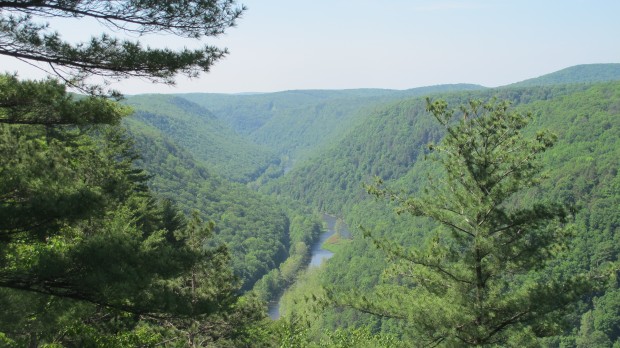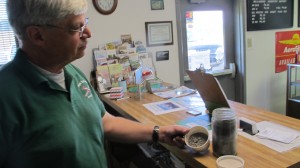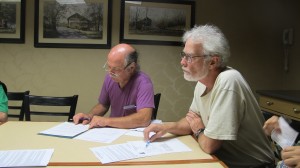Project would bring 400,000 tons of drilling waste to Pa.’s ‘Grand Canyon’

Marie Cusick/ StateImpact Pennsylvania
Plans call for 400,000 tons of natural gas drilling waste to be placed on a steep embankment near a tributary to the Pine Creek Gorge in Tioga County. The gorge is often called the Grand Canyon of Pennsylvania.
As Marcellus Shale gas drilling has proliferated, so has the amount of waste it generates. Last year in Pennsylvania, over two million tons of drill cuttings were sent to landfills.
Cuttings are the waste dirt and rock that comes up from drilling wells. The material contains naturally occurring radiation, heavy metals, and industrial chemicals.
Over the past three years, a Montgomery County waste disposal company has found a novel way to avoid landfills, by processing and recycling drill cuttings. But critics argue it’s simply a way to avoid regulations.
Now plans to put the gas waste next to one of the state’s most pristine waterways have sparked a backlash.
Pennsylvania’s Grand Canyon
As the manager of the Wellsboro Johnston airport, Craig Musser has a plan to get more air traffic to this rural part of north-central Pennsylvania.
But a lot of people really don’t like the idea.
“If I didn’t feel it was safe, I wouldn’t want to do it either,” he says.

Marie Cusick/ StateImpact Pennsylvania
Wellsboro Johnston Airport manager Craig Musser holds a sample jar of dried drill cuttings. He thinks the project will bring more economic opportunity to the region.
He hops in his car and drives to the edge of the runway to show me.
So what’s all the fuss about?
A Montgomery County waste disposal company called Clean Earth is proposing to haul in 400,000 tons of gas industry waste– specifically treated drill cuttings. If its plans are approved by state regulators, the company would relocate its Williamsport-based processing facility to the airport grounds. It would pay to lease the land, then use the cuttings to extend the runway by 600 feet, and eventually turn over the processing building to the airport for use as a hanger.
Musser thinks this will help the airport and, in turn, the local economy.
“To bring growth–an airport is a vital step towards that,” he says.
The plan has been met with major push back here in Tioga County—one of the most drilled-on places in the state.
That’s because the airport sits high atop one of the region’s most beautiful natural assets, and a major tourist destination: the Pine Creek Gorge. It’s often called the Grand Canyon of Pennsylvania. The airport’s runway is next to a steep embankment that’s a half-mile from a tributary to the gorge.
And that embankment is exactly where Clean Earth wants to put the drill cuttings.
Tioga County Commissioner Eric Coolige (R) says drillers have been “a godsend” to the area. But he and many other gas industry supporters (including state Senate Pro Tempore Joe Scarnati, who represents the area) are not sold on this idea.
“My concern is this product has not yet been given a 100 percent OK,” says Coolige. “And until it does, I’m not going to be in favor of it.”
Ed Osgood is a member of the Pine Creek Gorge Headwaters Protection Group. He also thinks it would be a big mistake to put so much drilling waste next to the gorge.
“We have no long-term, peer-reviewed studies to indicate this material is safe,” says Osgood.
He’s worried the waste could run into the gorge when it rains.
“I think the name Clean Earth is ironic,” he says. “This is anything but clean earth.”
Research and development?
Thanks to an exemption in federal law, none of the waste generated by the oil and gas industry is considered hazardous. No matter what’s in it. Clean Earth declined multiple interview requests for this story but says in a statement it’s been handling the waste “with the highest integrity.” The company has already disposed of 172,000 tons of it in recent years thanks to a special permit from the state Department of Environmental Protection (DEP).
In 2011, Clean Earth got the permit to do research and development to examine the beneficial re-use of drill cuttings. The idea is to do something with it, rather than send it off to a landfill. Clean Earth takes the muddy cuttings that come out of gas wells, mixes it with cement, and tests it, before placing it old, polluted industrial sites known as brownfields.
Steve Socash has been in charge of reviewing the permit for DEP.
“We’re still evaluating the information at the current time,” he says. “We haven’t completed our review of Clean Earth’s conclusions.”
Since 2011, Clean Earth has put drill cuttings in an abandoned coal mine and two brownfields around the state.
And this has really rubbed some people in the waste business the wrong way.
In 2013 the Pennsylvania Waste Industries Association, a trade group representing landfill owners, sent a letter to DEP urging it to deny a renewal of Clean Earth’s permit. They argued it’s not really a small-time research operation, instead it’s a full-scale commercial enterprise designed to avoid regulations.
Despite their objections, DEP renewed the permit through 2017.
“A good idea”
Although the agency is still studying the practice, Socash doesn’t think people should be alarmed by the idea of recycling drill cuttings.
“DEP believes evaluating drill cuttings to see if they can be beneficially used is a good idea.”
Earlier this year, DEP issued a study which found the natural radiation from drill cuttings poses little threat to public health. It said that disposal techniques in landfills were safe. But the study didn’t look at the kind of work Clean Earth is doing– whether it was safe to re-use the waste.

Marie Cusick/ StateImpact Pennsylvania
Pine Creek Headwaters Protection Group members Bryn Hammarstrom (left) and Bob Ross.
Back in Tioga County, the Pine Creek Headwaters Protection group has been meeting regularly to investigate the airport project.
Group member Bryn Hammarstrom has been upset by the surge in gas drilling in his backyard in recent years, but thinks this project simply goes too far.
“We can’t stop hydraulic fracturing,” he says. “But we can at least try and make the disposal of the byproducts of hydraulic fracturing done as safely to the environmental and to the population of Tioga County as possible.”
DEP says it doesn’t know when it will make a decision on the project.
















